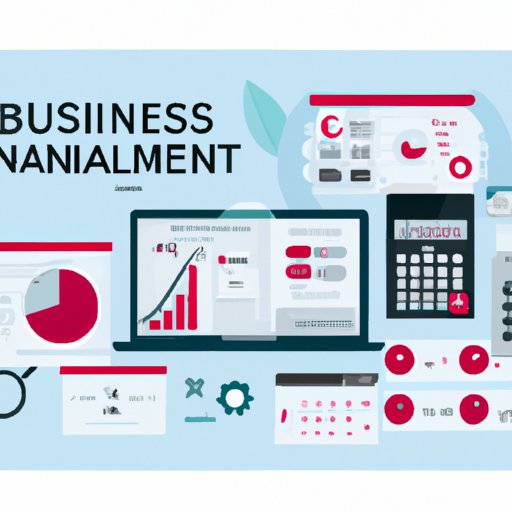Introduction
Developing a business financial plan is an important step for any entrepreneur or business owner. A financial plan helps business owners make sound decisions about their finances and assess the risks and opportunities associated with their business. It also serves as a roadmap for achieving the company’s long-term goals and objectives.

Benefits of Creating a Financial Plan
Creating a financial plan has a number of benefits for businesses. First, it allows entrepreneurs to set realistic expectations for their businesses. By understanding their current financial situation and forecasting future trends, they can make better decisions about how to allocate resources and manage their finances. Second, a financial plan can help entrepreneurs identify potential risks and opportunities, such as market changes, technological advancements, and competitive forces. Finally, a financial plan can serve as a guide to track progress and measure success over time.
Steps Involved in Developing a Financial Plan
There are several steps involved in creating a business financial plan. Here are some of the most important ones:
Establishing Goals and Objectives
The first step in creating a financial plan is to establish goals and objectives for the business. These should be specific and measurable, and should take into account both short- and long-term goals. The goals and objectives should also be realistic and achievable within the timeframe established by the business.
Determining Financing Needs
Once the goals and objectives have been established, the next step is to determine the business’s financing needs. This includes assessing the amount of capital needed to start or expand the business, as well as the sources of funding that are available. This information can then be used to create a budget for the business that takes into account both expected income and expenses.
Establishing Cash Flow Projections
The next step in creating a financial plan is to establish cash flow projections. This involves forecasting both expected income and expenses over a period of time, usually at least one year. This information can then be used to develop strategies for managing cash flow, such as setting up a reserve fund for unexpected expenses or investing in assets that generate additional revenue.
Assessing Risks and Opportunities
Finally, it is important to assess both the risks and opportunities associated with the business. This includes evaluating potential threats to the business, such as competition, changing market conditions, and technological developments, as well as identifying potential areas of growth. This information can then be used to develop strategies for mitigating risks and taking advantage of opportunities.

Examples of Common Business Financial Plans
There are several types of financial plans that are commonly used by businesses. Here are some of the most common ones:
Startup Financial Plan
A startup financial plan is used by entrepreneurs who are just starting their business. This type of plan typically includes financing needs, cash flow projections, and a budget for the business. It may also include information about potential risks and opportunities.
Growth Financial Plan
A growth financial plan is used by businesses that are looking to expand their operations. This type of plan typically includes financing needs, cash flow projections, and a budget for the business, as well as a detailed analysis of potential risks and opportunities. It may also include strategies for managing cash flow and investing in assets.
Expansion Financial Plan
An expansion financial plan is used by businesses that are looking to expand into new markets or launch new products and services. This type of plan typically includes financing needs, cash flow projections, and a budget for the business, as well as an analysis of potential risks and opportunities. It may also include strategies for managing cash flow and investing in assets.

Resources and Tools for Building a Financial Plan
There are several resources and tools available to help entrepreneurs and business owners create a financial plan. Here are some of the most useful ones:
Online Financial Calculators
Online financial calculators are designed to help business owners calculate their financing needs and cash flow projections. These tools can be used to estimate the cost of starting or expanding a business, as well as to forecast future income and expenses.
Business Planning Software
Business planning software is designed to help entrepreneurs create comprehensive financial plans. These tools can be used to develop budgets, analyze potential risks and opportunities, and track progress over time.
Professional Consultants
Finally, entrepreneurs and business owners can also hire professional consultants to help them create a financial plan. These professionals can provide valuable advice on financing needs, cash flow projections, and risk management strategies.
Conclusion
Creating a business financial plan is an important step for any entrepreneur or business owner. A financial plan helps business owners make sound decisions about their finances and assess the risks and opportunities associated with their business. There are several steps involved in creating a financial plan, such as establishing goals and objectives, determining financing needs, and establishing cash flow projections. In addition, there are a number of resources and tools available to help entrepreneurs and business owners create a financial plan, such as online financial calculators, business planning software, and professional consultants.
(Note: Is this article not meeting your expectations? Do you have knowledge or insights to share? Unlock new opportunities and expand your reach by joining our authors team. Click Registration to join us and share your expertise with our readers.)
